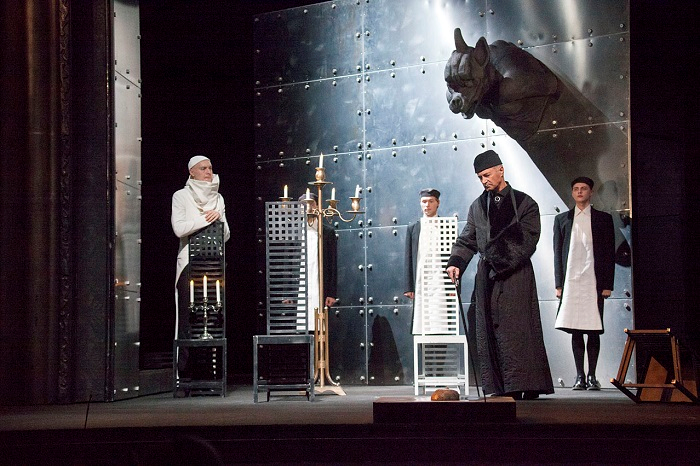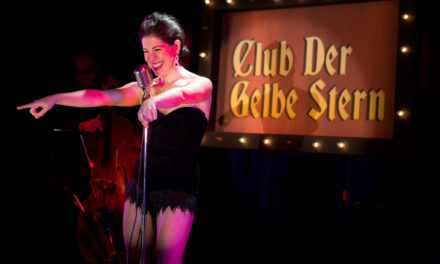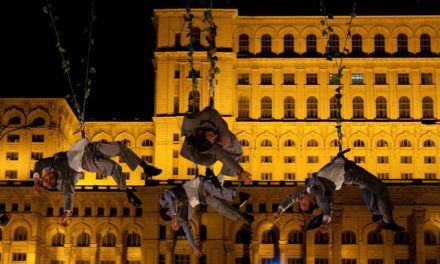It is impossible to put it in writing,
but to record the horror of the thing here is a black cross mark.The Cabal of Hypocrites, Mikhail Bulgakov
On January 13, or about that time (cf. The Life of Monsieur de Molière by Mikhail Bulgakov), a certain Jean-Baptiste Poquelin, known by his stage name Molière, was born.
On September 13, on the stage of the Lenkom theatre, a certain production, titled Dreams of M. de Molière, was brought into the world. It was a still-birth.

Molière (Igor Mirkurbanov). Photo: Alexander Sternin (from the official website of the Lenkom Theatre)
It is a bitter task to write an obituary for a theatre production, especially when the diseased is still on. Actors keep deserting the show; spectators keep leaving before the end of the performance. The price of the tickets has to be reduced on a regular basis.
Could all this mischief come from the long dozen?
“My children just don’t survive infancy, Your Majesty,” Bulgakov made his Molière say—as if foretelling the brief onstage life of his own plays. The plays were banned, cut, closed.
Seven years passed from the completion of the play to the opening night. Seven times, all in all, the show was performed.
On February 16, 1936, the show opened at the Moscow Art Theatre. On February 17, 1673, Molière died. There is something mystical, cabbalistic about the numbers matching like this, and Bulgakov did describe himself as a writer not foreign to the mystical.
In 1966, Molière (or, in fact, The Cabal of Hypocrites, the title that was thrust on the author in the thirties, and still remained valid thirty years later) became the last of Anatoly Efros’ productions at the Lenkom Theatre. In 1967, he had to resign from his post as head of the theatre.
Is it the belated echo of those bygone events mystically resonating at the Lenkom theatre now?
This production, done by Pavel Safonov, provokes many a question and, at the same time, puts the reviewer in a position very similar to that of the Register—the character who chronicles the events that befell Molière’s company in the play, and who, time and again, sets out to search for the answers, look into the causes, yet, invariably, finds himself powerless to prevent a single misfortune, and thus ruefully resorts to putting down more and more black crosses in his log.
It is the Register, blowing the dust off his manuscript, who opens the show. A metaphor for the upswept dust that both the play and the events it presents have accumulated in the course of time, some might think. But, paradoxically, in Lenkom, instead of removing this dust, the creators laboriously apply even more of a like substance upon Bulgakov’s text. The faces are powdered, the show is powdered. The finale settles the question: the chronicler was not so much blowing the dust off, as throwing dust in the eyes of the audience, for the purposes of clearer perception.

A crowd scene from Dreams of M. de Molière. Photo: Alexander Sternin (from the official website of the Lenkom Theatre)
The powder is a means of making things up, of masking reality. And, indeed, there is something about this theatrical production that bears resemblance to a raid carried out by masked officers of a special branch—the kind of operation that, decades ago, acquired the nick-name «masked-show», after a popular TV comedy show. And it seems only proper, in times when balaclavas, or ski-masks, are worn for the purpose of masking identities, when officers of the law escorting a theatre director into the courtroom hide their faces, that mask becomes the signature theme of the epoch.
In this production, we have masks of all kinds—Italian, Japanese, animal masks, cloth half-masks, the «beaked» plague doctors’ masks, impersonal Volto masks—that turn into death masks. The very title—Dreams of . . . — is masking. Dream, as a form of narration, is a very convenient way of forestalling reproach.
The title of this production, being heir to the title of the censored version, consequently makes the shift, in the narration as a whole, from The Cabal of Hypocrites to M. Molière; from the universal human tragedy to romantic dramedy.
Presumably, the theatre must have seen something contemporary in this Bulgakov play to introduce it into their repertoire; something resonant with the anxious mood prevailing in society—the feverish condition of the cultural workers’ community included. Then, what is the point of camouflaging their findings, doing everything in their power to make this, relevant for the present-day, play as alien for the audience as possible?
Was the theatre apprehensive that The Cabal of Hypocrites in large print on a theatrical bill might be mistaken for a picketer’s sign—in times when controversy around a movie, the biopic Matilda, fueled by religious zeal, blazes up into something little short of warfare, and the panel of experts on theatrical issues, under the auspices of the Ministry for Culture, seems to be nursing the dream of transforming theatre into a house of worship, as the phrase goes, but literally meaning to worship in there anything but the Arts?
Molière is dreaming. His dreams are scenes of his own past, episodes written by him (and, with him, used as a writing implement); dreams that are either terminal delirium or dreamed from beyond the grave; a sort of a posthumous flashback of his earthly experiences, faded, dull, seen through the shroud of the big sleep. “Ay, there’s the rub;/ For in that sleep of death what dreams may come. . . .“
Molière, Igor Mirkurbanov attired in a cloak, seems to be a case of self-inflicted artistic sabotage, or a hoax to test the loyalty of the actor’s fans: how will they respond to their idol appearing in so weird an image under the skies of the Lenkom theatre?
https://www.youtube.com/watch?v=x5prMJTcHs8?rel=0
What the actor offers is a rough study for the role, an oversimplified and superficial sketch. Either the force of habit-forming, or—after years of discontent and self-discipline—self-complacency coming, welcomed warmly by the audience pleased to see the actor so consistent with their expectations, made a new benchmark he is measuring his performance against now. To provide not the unexpected, but that which the public has come to love.
Poor cutting, done at the director’s hands, ruined the diamond. It is sad to see a giant turn performer, an executive, a carrier of the text for a role that became a chore. Thus the faded, inert, arhythmical quality of some episodes, though this is a play of close-ups, as there are no middling scenes in it. Too dear a price had the author paid for this play for his misfortunes not to reverberate in it even now. After the play was banned by Glavrepertkom (the Repertoire Committee), Bulgakov was close to suicide. He was burning his manuscripts. And when he wrote, in his letter to the Government, that he was facing “poverty, homelessness, and ruin,” he was not exaggerating for effect.

Madlena Bezhar (Anna Bolshova). Photo: Alexander Sternin (from the official website of the Lenkom Theatre)
What we are presented here is a Molière cast in bronze; a Molière not shying away from prosperity and boons. The final mise-en-scène copies the Molière monument in Paris. According to tradition, the playwright collapsed in an armchair on stage. Mirkurbanov is sitting in his chair heavily, as if he, indeed, is a statue, becoming more and more bronze-like before the eyes of the audience.
Mirkurbanov’s Molière craves rewards and recognition, which makes him nearly an equal to Muarron, who brags about the newly acquired nobiliary particle and the title that was granted to him. If the director’s intention was to stage “de Molière” (it is no accident that the title of the production contains the particle), then the actor fulfilled his task perfectly. Bulgakov interpreted this acquired nobiliary particle as a burden for his Molière; Safonov presents it as a shoulder knot. This Molière looks much more pleased when allotting 500 livres to himself than when giving away several thousands of the money that was presented by the King to be distributed among his actors.
If this production does introduce something new into interpreting Molière’s character, it is this emphasis on the materialistic core of his personality. In response to Madlen’s heartbreaking confessions, he cynically and rudely promises that the theatre will pay her a pension. It grates upon the ear. When deserted by his young wife, he is concerned that “diamond rings are thrown all over the floor.”
This Molière is deprived of the very backbone of his personality, and his quill is robbed of its shaft. The audience has to take on faith that Molière is a genius, or, by their own effort, transfer that description, justly attributed to the real person, to the character of the play.
The emphasis is shifted. It is not the authority that suppresses and stifles creative artists; it is the creative artists who crush each other in their eagerness to get nearer to the throne, doing exactly what Rostand’s Cyrano described as an unacceptable choice: “With frame aweary climbing stairs? A skin/ grown grimed and horny,—here, about the knees?/ And, acrobat like, teach my back to bend?” Throughout the show, Molière straightens up not once, his back is always bent. There are many awkward points of mise-en-scène in this production that have the title character with his back to the audience. Of course, it is possible that the director just sees his character this way—forever bent. And this bent character lacks the notorious “character arc”; he does not undergo any transformation. So, the production insists, the burden that bends him down is not the oppression of censorship at all.
“I adore you, my King!” exclaims Molière with vehement sincerity, drunk with his closeness to the Sun of France, admiring himself so grand in the benevolent sunshine. At times, he does not dare to look at the Sovereign; at times, contrary to the attitude he has seemingly chosen, he boldly stares at him, though neither his voice, nor his gestures become any bolder. It is not the case of squeezing the innate servility out drop by drop—the famous character arc suggested by Chekhov in a letter to a publisher. It is the case of servility being the necessary and irrefutable manner of existence; it is a habit that Molière has no intention of giving up. He is not a rebel overthrowing the foundations of the monarchy at all, but a man cleverly maneuvering in the circumstances it offers, himself enchanted by its grandness. He is not just a subject; he is a loyal subject.
What he is acting out is the idea which Bulgakov puts in the mouth of Molière’s biographer: “actors love any kind of authority passionately. And how else can it be? Only under the strong, stable, and moneyed authority can theatre art thrive.” Yet, Bulgakov and the directors of the best-known productions of this play all draw a line between Molière’s actors, who repeat “The King is applauding!” as if it were a chorus line, and Molière himself, who does not care for trumpery. There is no such line in Dreams . . . .

Igor Mirkurbanov, Anna Bolshova. Photo: Alexander Sternin (from the official website of the Lenkom Theatre)
Molière, who had put, in terms of influence and significance, comedy on the same level with tragedy, here strains to press the favorably-disposed-to-him Thalia into His Majesty’s Service: “Oh Muse, my Muse, oh my sly Thalia!/ Every night I, hearing your screaming calls . . . .“ The Muse screams indeed and in earnest, yet Molière would not come to his senses; he continues with his antics and affectations, till the King orders him to stick to comedies only. And though this is exactly what the famous comediographer is doing and has been doing all his life, yet, more and more often, the tragic and the serious begin to make trespassing appearances under the sign of a genre considered to be light entertainment. The time has come to give up comedy, but the authority enforces keeping it comical.
“Oh, hard is the progress of an artist under the wakeful eye of a formidable authority!” But there is no formidable authority in Dreams . . . , and as for “wakeful,” it really clashes with the title. The impression is that the hero is snapping at his friends and family, giving vent to his anger for trifling causes, mostly because he has to stifle the rebellious spirit within himself, but there is not a single scene in this production showing the authorities persecuting Molière. Except that they dazzle him with their glamour—but with a Master of that caliber, his art should have provided him with some protective implement against this kind of blindness, shouldn’t it?
Mirkurbanov’s Molière is a very Russian character. He is the kind of person who likes to criticize the authorities in the safety of his own kitchen, over a glass or two of wine. The key Molière scene is done here in the form of delirious ravings of an artist who thinks too much of himself. “But like wine, the sorrows of the days bygone/ stored in my soul become the stronger the older they get,” Pushkin pointed out in his elegy; yet, here, wine is not metaphorical, but one of the many cases of taking things too literally. Molière could get drunk with acting on stage, could work himself into a state of great emotional excitement, without resorting to alcoholic beverages. But this Molière is tipsy when delivering his invective monologue condemning the tyrannical King. There is nothing in Bulgakov’s play to imply that Molière is drunk; on the contrary, the author thought the sobriety of his hero an important enough point, hence these lines: “Has he been drinking?/ Not a drop.”

Molière (Igor Mirkurbanov). Photo: Alexander Sternin (from the official website of the Lenkom Theatre)
The director, who does not ignore realities of the present day, had a chance to redress the injustice that had historically been done to the play, and use the version of the monologue that had not been crippled by censorship. Instead, Safonov, of all the available castrated versions, chose the mildest one; nay, he turned all the ambiguous statements into vulgar verbiage. The fateful monologue was devaluated.
The censors of the thirties, unlike the director who lives in our days and is free from being bothered by censorship, understood the author’s idea perfectly well. Bulgakov had an almost wordless character in his play, Nun, who briefly appeared in the finale—as an evil omen, as doom, as the fate. “Fate” is the very last word that Lagrange the Register writes down in his log—and that word ends the play. The censors of the thirties were terribly disturbed by this mystic character. It is not the monarch, nor the clergy, nor the cabotinage, nor the betrayals and adultery, nor the rumors that Molière is struggling with, but the fate, the doom, the fatum. “The Fate has grasped me by the throat,” wrote Bulgakov in a letter to a close friend. “Fate has come to me at my home, and robbed me of everything,” says Molière in the play, nearly repeating what the playwright who had created him had said in real life. This, mostly invisible, but very much felt, presence, this Fate character, does not appear in Dreams . . . at all. The character was dismissed, the Fate’s office was deemed redundant.
One of the most significant symbols of the production is the stool. It is standing on this stool that Molière, like a child lifted high to perform before grown-ups, recites his laudatory address to the King. From that very stool, and with the like histrionics, he later utters his drunken invectives condemning the same monarch. In the scene at court, when Molière is invited by the King to join him at his meal, the seat hastily provided for the playwright is again this stool. And, finally, the stool will become the seat to take to undergo questioning and accusations. He does not share the monarch’s meal here, because he himself is a dish. “My playwright,” like “my dessert.” His function is to entertain, to be instrumental to enhancing the fame of the monarch.
In Dreams . . . , with its treacherous, conformist logic, typical for “denouncing the bohemian style of life” presentations, the actors rebel only when stripped of privileges, boons, patronage. They rebel when they have nothing to lose. Considering this season is overshadowed by the duel between Themis and Melpomene (the case of Kirill Serebrennikov), such interpretation seems, at the very least, ill-appropriate.
https://www.youtube.com/watch?v=609mGyeHfqk?rel=0
The title dreams in the Dreams of M. de Molière are also dreams of Molière’s master, the King. Now that is certainly a character who can use some distraction to give him rest from his most false surroundings. The King finds the histrionics of the real life around him painfully offensive, which might be the reason why he believes the performances on the theatre stage to be more honest. It seems that, in the finale, the Master of Ceremonies must shout: “The king of drama is dead, long live the King!”

Louis XIV (Eugeny Gerasimov). Photo: Alexander Sternin (from the official website of the Lenkom Theatre)
Louis XIV reigned longer than any other monarch in Europe. Molière died when he was 51. The King of France proved to have more foresight than the king of drama. Generally, the authorities in the play, be it the King, or the Cabal, act with more subtlety and finesse than the loud-mouthed artists, who, overwhelmed with emotions, easily lose their heads in their excitement.
Bulgakov in personae entered the King not as Louis XIV, but as Louis the Great (Louis le Grand). The King is played by Eugeny Gerasimov, a Mosgorduma (Moscow city council) deputy. Artistic activities are not forbidden to deputies, and, the newly introduced into the production actor enjoys playing on the Lenkom stage a lot. Gerasimov delights in his role to the extent of not bothering much about delighting his audience. He obviously loves it all, the crown, the fabulous silvery royal robes, all those courteous mannerisms that are so scenic. The role of the Great might be too big for him, but he, surely, finds it great.
Very significant is the interlude, a crowd scene in which all the extras are engaged, playing musketeers—the armed force that is safeguarding the regime. It is a mime representing a rat-hunt: the musketeers roam about the palace killing rats that have become too numerous. If we choose to generalize, Dreams . . . are about rats. Rats that contaminate minds with plague (thus the members of the Cabal wear Plague medicos’ masks); rats who dwell in basements, that harbor people, too—people of art more and more often lately. “Basement theatre” as a phrase is a fixture, yet it may unfix a statehood.
The 1973 TV adaptation of Bulgakov’s play that was directed by Efros, with the great Yury Lyubimov starring in the title role of Molière, very convincingly showed that both paths that theatre may take, the Efros way (apolitical theatre) or the Lyubimov way (frondeur theatre), come essentially to one and the same thing. The Lenkom Dreams . . . chose a third way: to once again make a showy show meant to be “timeless.” Yet, time overtook it. And the dreams that the theatre uses to shield itself from reality did not help.

A crowd scene from Dreams of M. de Molière. Photo: Alexander Sternin (from the official website of the Lenkom Theatre)
In the end, all the characters of the play, those still alive as well as the dead ones, come on stage to play the finale. Among the latter we can include the home of this production, the Lenkom theatre, a theatre stricken with gangrenous theatricality. So, we have all the characters gathered together, serving the Arts and the Theatre, and serving a Requiem Mass for the repose of Molière’s soul, while, at the same time, doing their duty in active service by making this most Christian and reconciliatory finale. “Anybody stayed in the theatre after the end of the show?” the character Lagrange the Register was crying out in the beginning of the play, while making the last round before closing the playhouse for the night, and one feels very much like asking in parallel: “Anything stayed in the minds of the audience after the end of the show?” One may only wish one thing for the Lenkom theatre and the actors engaged in «Wake up!»
https://www.youtube.com/watch?v=cuDD1BdCtIM?rel=0
This article originally appeared in Critical Stages/Scènes Critiques. Reprinted with permission of the author. Read the original article here.
This post was written by the author in their personal capacity.The opinions expressed in this article are the author’s own and do not reflect the view of The Theatre Times, their staff or collaborators.
This post was written by Emiliia Dementsova.
The views expressed here belong to the author and do not necessarily reflect our views and opinions.


















